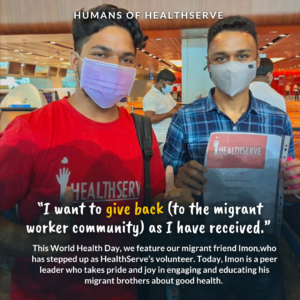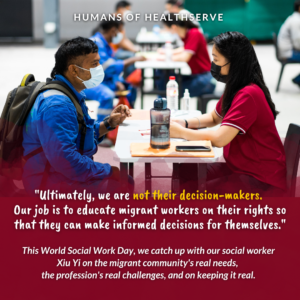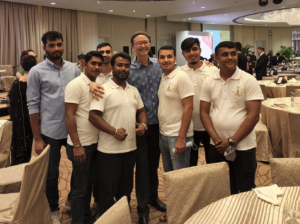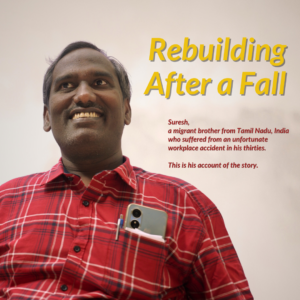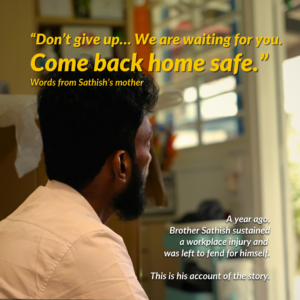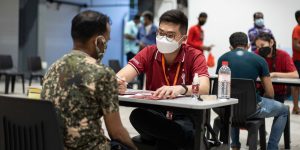Reflections by Dickson Tong, former HealthServe intern & University of Hong Kong’s (HKU) School of Public Health student

“Thank you sir (for) helping me!” he said, warmly patting my thigh.
We were sitting on a couch at the clinic in Orchard, waiting to see the Ear, Nose, and Throat (ENT) specialist.
I was accompanying a migrant worker, Faroque, along with HealthServe’s caseworker Daniel, for his external ENT referral from our HealthServe clinic. Faroque suffered from persistent pain and discharge from his right ear – he had been struggling with this condition for a while and it was affecting his daily life. As we waited for his turn, I started chatting with him to learn more about his life back in Bangladesh and his journey to Singapore.
Born and raised in Dhaka, Faroque grew up in a family that owned a small banana plantation business run by his father. Upon graduation from high school, he continued working with his family to take care of their farms, having a self-sufficient life in Bangladesh. He is happily married with two children – one daughter and one son – who are currently studying. Interestingly, in Bangladesh, they adopted the Chinese family tradition, where men are the breadwinners and women, stay-home caregivers of their families.
“My father passed away… (that was the reason) I came to Singapore to work.”
Unfortunately, without his father, Faroque was unable to run the business and abruptly ended it. To make matters worse, his mother’s health condition had worsened over time, which chalked up a lot of medical expenses which his family was unable to afford.
Having heard from his cousin and friends about working in Singapore, Faroque decided to go abroad to work as a shipyard worker. After learning that he had to pay a huge agent fee to secure his position in the Singapore company, he made the painful decision to sell their land, and borrowed more money. He now earns around S$600-700 per month. Thankfully, he has since paid off all his debts. I could still recall him being upset by the income disparity across nationalities:
“Bangla men earn very little… we work the same, (but) Indian men and Chinese men earn more money.”
Thinking back to his first time in Singapore, Faroque shared with me that his family had been his strong support to keep him motivated and not feel lonely. As a multicultural nation-state, Faroque could easily source raw ingredients from local supermarkets to cook his meals in his dormitory in Singapore.
When I asked him to rate and compare Bangladesh food in Singapore and back in his hometown, he laughed. “No difference, but Singapore food (is) more expensive!” I couldn’t help but agree with him.
As we were waiting for medication prescription and payment, I could sense Faroque’s relief after seeing the specialist, although further laboratory analysis was still required to accurately identify the source of infection. Even though the consultation fee was costly relative to his monthly earnings, I was surprised by the reduced price he needed to pay, thanks to HealthServe’s partnership with the specialist clinic. In Singapore, it is widely acknowledged that consultation sessions with private medical specialists are very expensive, yet our partners had been so kind to extend their expertise and services to low-wage migrant workers at heavily subsidised prices.
Today, there is a huge demand for specialist medical care among the migrant community. Yet, not only is it very challenging for them to arrange a consultation session on their own, it is also extremely expensive – Most will not be willing to prioritise their own health over their family. The availability of such services in the HealthServe clinic was no doubt a huge blessing to these workers in need.
Rain poured heavily as we were in transit returning to the HealthServe clinic for medication. Faroque put his arm on my shoulder, I opened my umbrella, and we slowly walked back to the office together under a shared umbrella.
Often, many of us misperceive or wrongfully label low-wage migrant workers. But in reality, they are no different from us. It is the cultural unfamiliarity and social stigmatisation that build barriers between communities. How can we break down these walls, and build bridges instead?
When I first came to Singapore, I had been worried about communicating with migrant workers due to language barriers and cultural differences, but they had turned out to so much more amiable.
We still have a long way to go before the elimination of racial stigmatisation and discrimination, but only by embracing the beauty of diversity and actually listening to their voices can we make our first step towards progress towards cultural harmony.
